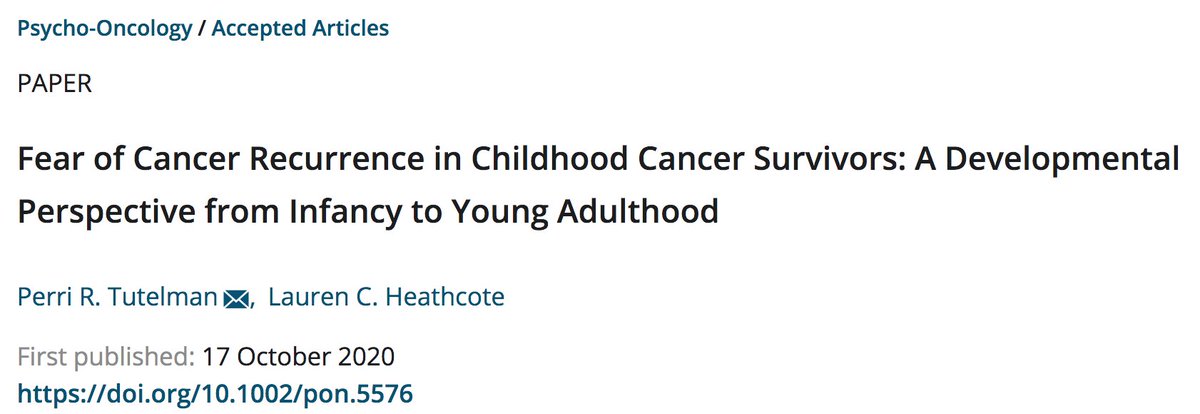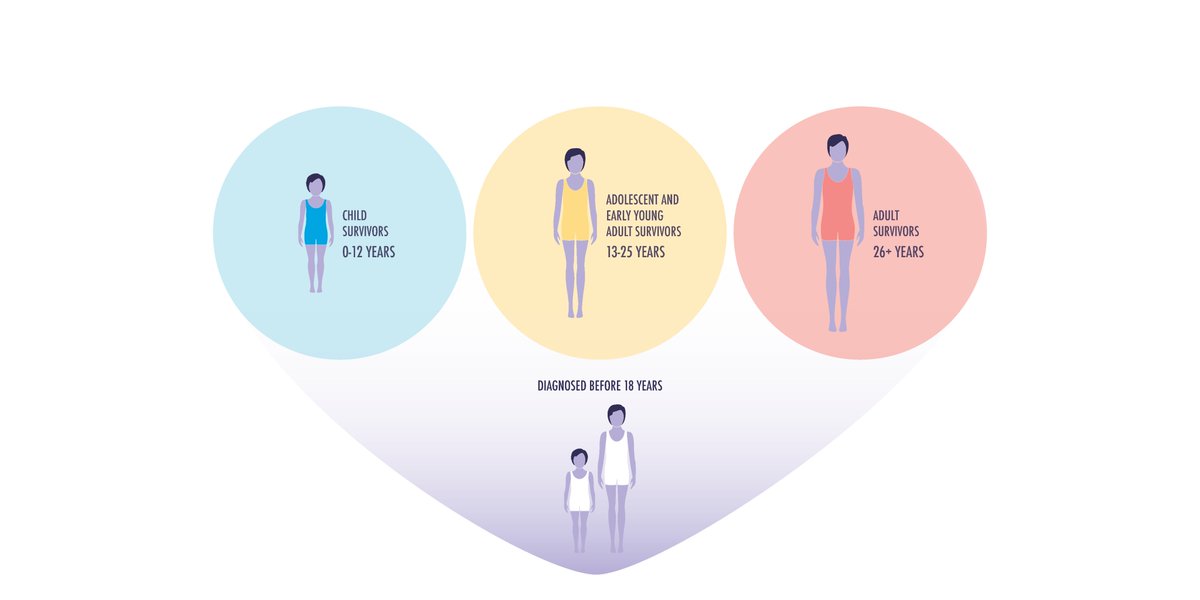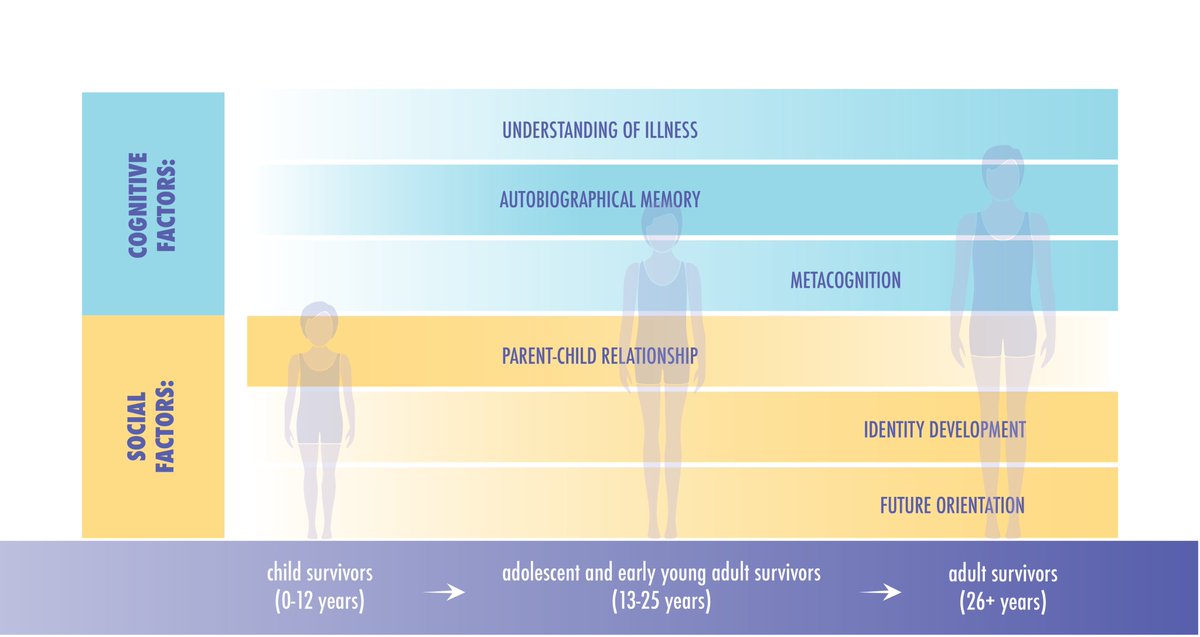How is #fearofrecurrence experienced by #childhoodcancer survivors across the developmental trajectory?
A thread on our new model of fear of cancer recurrence in childhood cancer survivors.
Commentary now published in Psycho-Oncology https://abs.twimg.com/emoji/v2/... draggable="false" alt="👇" title="Rückhand Zeigefinger nach unten" aria-label="Emoji: Rückhand Zeigefinger nach unten">
https://abs.twimg.com/emoji/v2/... draggable="false" alt="👇" title="Rückhand Zeigefinger nach unten" aria-label="Emoji: Rückhand Zeigefinger nach unten">
https://onlinelibrary.wiley.com/doi/10.1002/pon.5576
1/7">https://onlinelibrary.wiley.com/doi/10.10...
A thread on our new model of fear of cancer recurrence in childhood cancer survivors.
Commentary now published in Psycho-Oncology
https://onlinelibrary.wiley.com/doi/10.1002/pon.5576
1/7">https://onlinelibrary.wiley.com/doi/10.10...
#FCR is among the most prevalent and distressing concerns reported by #cancersurvivors.
While younger age is the most consistent predictor of elevated FCR, research to date has focused almost exclusively on adult survivors.
2/7
While younger age is the most consistent predictor of elevated FCR, research to date has focused almost exclusively on adult survivors.
2/7
This is despite the fact that kids are more likely to survive cancer & are lifelong users of the medical system. They also have the most vital decades of their lives to plan for, making #FCR a relevant issue.
Yet, only a few studies have explored #FCR in peds populations.
3/7
Yet, only a few studies have explored #FCR in peds populations.
3/7
In our new commentary @LCHeathcote and I present a developmental perspective of FCR from infancy through to young adulthood
First we propose 3 groupings of childhood cancer survivors as this term refers to ppl who exist across all developmental stages
 https://abs.twimg.com/emoji/v2/... draggable="false" alt="📷" title="Kamera" aria-label="Emoji: Kamera"> @designsthatcell
https://abs.twimg.com/emoji/v2/... draggable="false" alt="📷" title="Kamera" aria-label="Emoji: Kamera"> @designsthatcell
4/7
First we propose 3 groupings of childhood cancer survivors as this term refers to ppl who exist across all developmental stages
4/7
We draw on the developmental science literature & recent theoretical advancements in #FCR to outline various #cognitive and #social factors likely influence FCR in #childhoodcancer survivors.
Many aspects of FCR theory have developmental components that must be considered.
5/7
Many aspects of FCR theory have developmental components that must be considered.
5/7
We also highlight priority research areas for understanding #FCR in childhood cancer survivors across various domains including:
 https://abs.twimg.com/emoji/v2/... draggable="false" alt="▶️" title="Nach rechts zeigendes Dreieck" aria-label="Emoji: Nach rechts zeigendes Dreieck"> Measurement
https://abs.twimg.com/emoji/v2/... draggable="false" alt="▶️" title="Nach rechts zeigendes Dreieck" aria-label="Emoji: Nach rechts zeigendes Dreieck"> Measurement
 https://abs.twimg.com/emoji/v2/... draggable="false" alt="▶️" title="Nach rechts zeigendes Dreieck" aria-label="Emoji: Nach rechts zeigendes Dreieck"> Prevalence
https://abs.twimg.com/emoji/v2/... draggable="false" alt="▶️" title="Nach rechts zeigendes Dreieck" aria-label="Emoji: Nach rechts zeigendes Dreieck"> Prevalence
 https://abs.twimg.com/emoji/v2/... draggable="false" alt="▶️" title="Nach rechts zeigendes Dreieck" aria-label="Emoji: Nach rechts zeigendes Dreieck"> Risk & Protective Factors
https://abs.twimg.com/emoji/v2/... draggable="false" alt="▶️" title="Nach rechts zeigendes Dreieck" aria-label="Emoji: Nach rechts zeigendes Dreieck"> Risk & Protective Factors
 https://abs.twimg.com/emoji/v2/... draggable="false" alt="▶️" title="Nach rechts zeigendes Dreieck" aria-label="Emoji: Nach rechts zeigendes Dreieck"> Consequences
https://abs.twimg.com/emoji/v2/... draggable="false" alt="▶️" title="Nach rechts zeigendes Dreieck" aria-label="Emoji: Nach rechts zeigendes Dreieck"> Consequences
 https://abs.twimg.com/emoji/v2/... draggable="false" alt="▶️" title="Nach rechts zeigendes Dreieck" aria-label="Emoji: Nach rechts zeigendes Dreieck"> Interventions
https://abs.twimg.com/emoji/v2/... draggable="false" alt="▶️" title="Nach rechts zeigendes Dreieck" aria-label="Emoji: Nach rechts zeigendes Dreieck"> Interventions
 https://abs.twimg.com/emoji/v2/... draggable="false" alt="▶️" title="Nach rechts zeigendes Dreieck" aria-label="Emoji: Nach rechts zeigendes Dreieck"> #KT & #PatientEngagement
https://abs.twimg.com/emoji/v2/... draggable="false" alt="▶️" title="Nach rechts zeigendes Dreieck" aria-label="Emoji: Nach rechts zeigendes Dreieck"> #KT & #PatientEngagement
6/7
6/7
In sum, #FCR in #ChildhoodCancer survivors is a clinically important but neglected area of cancer research.
Rigorous, theoretically driven empirical research is urgently needed to define the experience and consequences of FCR across the developmental trajectory.
7/7
Rigorous, theoretically driven empirical research is urgently needed to define the experience and consequences of FCR across the developmental trajectory.
7/7

 Read on Twitter
Read on Twitter https://onlinelibrary.wiley.com/doi/10.10..." title="How is #fearofrecurrence experienced by #childhoodcancer survivors across the developmental trajectory? A thread on our new model of fear of cancer recurrence in childhood cancer survivors. Commentary now published in Psycho-Oncology https://abs.twimg.com/emoji/v2/... draggable="false" alt="👇" title="Rückhand Zeigefinger nach unten" aria-label="Emoji: Rückhand Zeigefinger nach unten"> https://onlinelibrary.wiley.com/doi/10.10..." class="img-responsive" style="max-width:100%;"/>
https://onlinelibrary.wiley.com/doi/10.10..." title="How is #fearofrecurrence experienced by #childhoodcancer survivors across the developmental trajectory? A thread on our new model of fear of cancer recurrence in childhood cancer survivors. Commentary now published in Psycho-Oncology https://abs.twimg.com/emoji/v2/... draggable="false" alt="👇" title="Rückhand Zeigefinger nach unten" aria-label="Emoji: Rückhand Zeigefinger nach unten"> https://onlinelibrary.wiley.com/doi/10.10..." class="img-responsive" style="max-width:100%;"/>
 @designsthatcell 4/7" title="In our new commentary @LCHeathcote and I present a developmental perspective of FCR from infancy through to young adulthoodFirst we propose 3 groupings of childhood cancer survivors as this term refers to ppl who exist across all developmental stages https://abs.twimg.com/emoji/v2/... draggable="false" alt="📷" title="Kamera" aria-label="Emoji: Kamera"> @designsthatcell 4/7" class="img-responsive" style="max-width:100%;"/>
@designsthatcell 4/7" title="In our new commentary @LCHeathcote and I present a developmental perspective of FCR from infancy through to young adulthoodFirst we propose 3 groupings of childhood cancer survivors as this term refers to ppl who exist across all developmental stages https://abs.twimg.com/emoji/v2/... draggable="false" alt="📷" title="Kamera" aria-label="Emoji: Kamera"> @designsthatcell 4/7" class="img-responsive" style="max-width:100%;"/>



